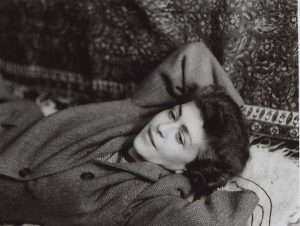
(Dec. 8, 1914-Dec. 27, 1972). Jean Garrigue was an influential poet known for her technical skill, unique lyrical style, and ability to artistically manipulate phrasing.
Garrigue—who changed her name from Gertrude Louise Garrigus in 1940— was born in Evansville, Indiana, to Allan Colfax and Gertrude (Heath) Garrigus. The family later moved to Indianapolis, and Garrigue graduated from in 1931. She attended briefly before transferring to the University of Chicago, where she graduated with a bachelor’s degree in 1937.
Garrigue continued her studies and received a Master of Fine Arts degree from the University of Iowa in 1943. During this time, she had her first work published in a literary magazine, the Kenyon Review (1941). After graduating, Garrigue briefly stayed in Iowa to teach creative writing at her alma mater. As with many in the creative field, she eventually moved to New York City where she worked various editorial jobs for publications such as Collier’s and The Flying Cadet to supplement her income while she wrote.
Through the mid to late 1940s, Garrigue published what are largely considered her best works. Her first collection of poems, “Thirty Six Poems and a Few Songs,” was published in James Laughlin’s Five Young American Poets in 1944. Three years later in 1947, Garrigue published her first book of poetry, The Ego and The Centaur. She also contributed poems to Cross-Sections that same year.
Around the 1950s, Garrigue took up teaching again. Several NYC colleges hired her to teach poetry and creative writing, including Bard College (1951), Queens College, and the New School. She also taught at several universities around the country. In addition to teaching, Garrigue received a Rockefeller grant in creative writing (1954) and a Hudson Review poetry fellowship (1957). She also contributed to New World Writing (1952) and published several more books: The Monument Rose (1953), Chartres and Prose Poems (1958), and A Water Walk by Ville d’Este (1959).
Garrigue spent the 1960s completing various fellowships including a Guggenheim fellowship (1960-1961), a National Academy of Arts and Letters fellowship (1962), and a fellowship at the Radcliffe Institute (1966–68). She also spent this period exploring other forms of writing. In addition to Garrigue’s Country Without Maps (1964) and New and Selected Poems (1967), she wrote a novella–The Animal Hotel (1966), and a nonfiction work–Marianne Moore (1965).
In the Spring of 1972, Garrigue was poet-in-residence at the University of California at Riverside. By the Fall of that year, she moved to Rhode Island to teach at Rhode Island College, but her time there was cut short due to health complications. Garrigue died of Hodgkins disease in December 1972. Her last book, Studies for an Actress and Other Poems, was published posthumously in 1973.

Help improve this entry
Contribute information, offer corrections, suggest images.
You can also recommend new entries related to this topic.